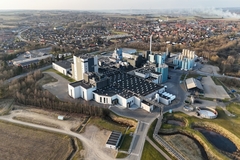
- Industry news
Industry news
- Category news
Category news
- Reports
- Key trends
- Multimedia
Multimedia
- Journal
- Events
- Suppliers
- Home
- Industry news
Industry news
- Category news
Category news
- Reports
- Key trends
- Multimedia
Multimedia
- Events
- Suppliers
RSSL Launches Test Kit for Casein in Highly Processed Foods

Where this new ELISA test kit differs from the standard ELISA kits used for detecting milk allergens is that it involves a step to deliberately denature the proteins as part of the extraction process prior to analysis.

5/23/2011 --- RSSL has validated a new test kit to detect the milk protein, casein, in highly processed foods. This is hugely significant since many of the test kits on the market can't detect highly processed proteins, yet these proteins can still remain allergenic for susceptible individuals. So it is important to have a reliable method that can detect highly processed proteins.
Where this new ELISA test kit differs from the standard ELISA kits used for detecting milk allergens is that it involves a step to deliberately denature the proteins as part of the extraction process prior to analysis. The antibodies in this kit have been raised to detect these denatured proteins. Denaturation is a process that changes the shape and configuration of proteins when they are heated and stressed by fermentation, high pressure and other intensive treatments. The remainder of ELISA test kits on the market cannot detect these denatured proteins because their antibodies have been raised to intact proteins.
This work is an example of RSSL’s commitment to partnering with customers with particularly challenging analytical requirements. The end result in this instance is that food companies that produce highly processed products now have a reliable, proven test kit for casein detection that has been UKAS validated for their needs. The test kit itself was developed in Japan and RSSL has worked closely with the manufacturer to undertake an extensive validation program to include this test kit in RSSL's UKAS flexible scope of accreditation. UKAS is an independent accreditation body that gives assurance to the laboratory and their customers about the reliability of analytical methods. The detection limit for this test is 2.5 mg/kg milk protein (2 mg/kg casein protein).
RSSL's validation work hints a huge risk that the wider food industry must face up to. In this specific case, there is a risk that using a conventional ELISA for the detection of milk proteins could result in a false negative result simply because the conventional test kit cannot detect highly denatured proteins. The bigger picture applies to all testing. All tests should be carried out with the proper validation controls and processes that RSSL routinely uses for all sample types. Without these, the results of all analytical tests cannot be relied on to be accurate, meaning food manufacturers may be accepting results of routine QC that fail to spot problems, or that suggest there is a problem where none exists.
“We are starting to see several companies use off-the-shelf test kits to validate their cleaning or to test products, which are not suited for use with their particular product,” notes Simon Flanagan. Simon is a Food Safety Consultant at RSSL, with responsibility for RSSL’s allergen training and consultancy business. The analytical laboratories at RSSL have been assessing a variety of off-the-shelf test kits and whilst they may work very well with some food matrices, they give poor results in others.
False positive and false negative results may be equally damaging for food producers. RSSL recently helped one client avoid a massive, unnecessary and potentially devastating recall after a false positive result from a test kit suggested there had been contamination.
“The whole area of allergen management is hugely complicated, both from the perspective of controlling ingredients and giving clear messages on labels,” notes Simon. “The training, consultancy and analytical support available from RSSL allows us to give a complete service to customers in order to regain control over their ingredient and allergen management issues.”










